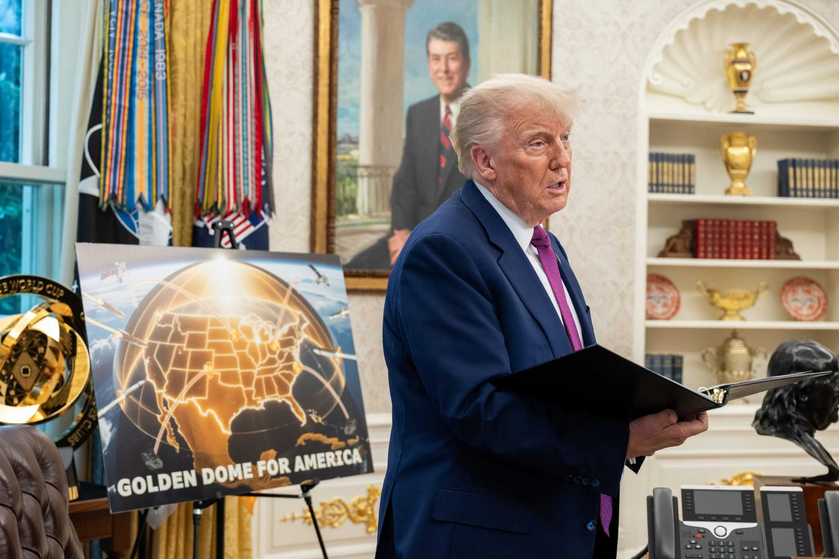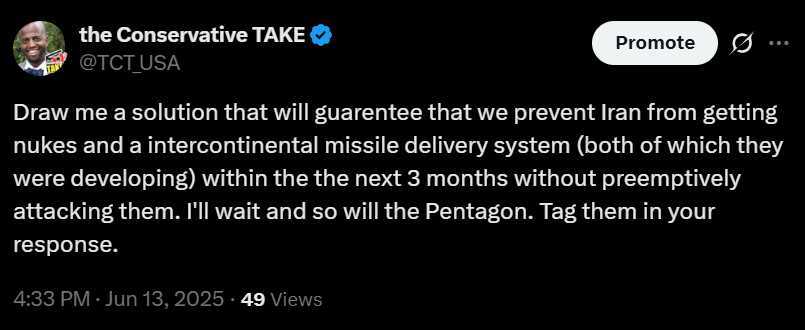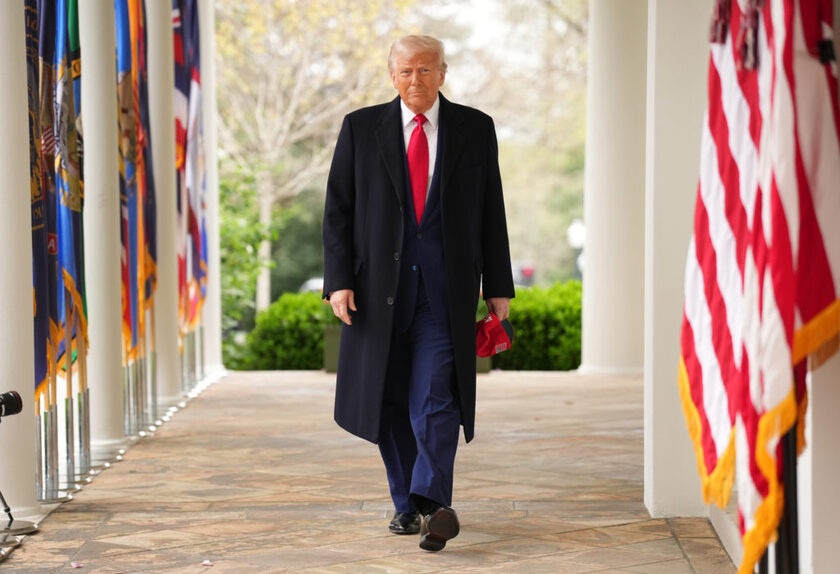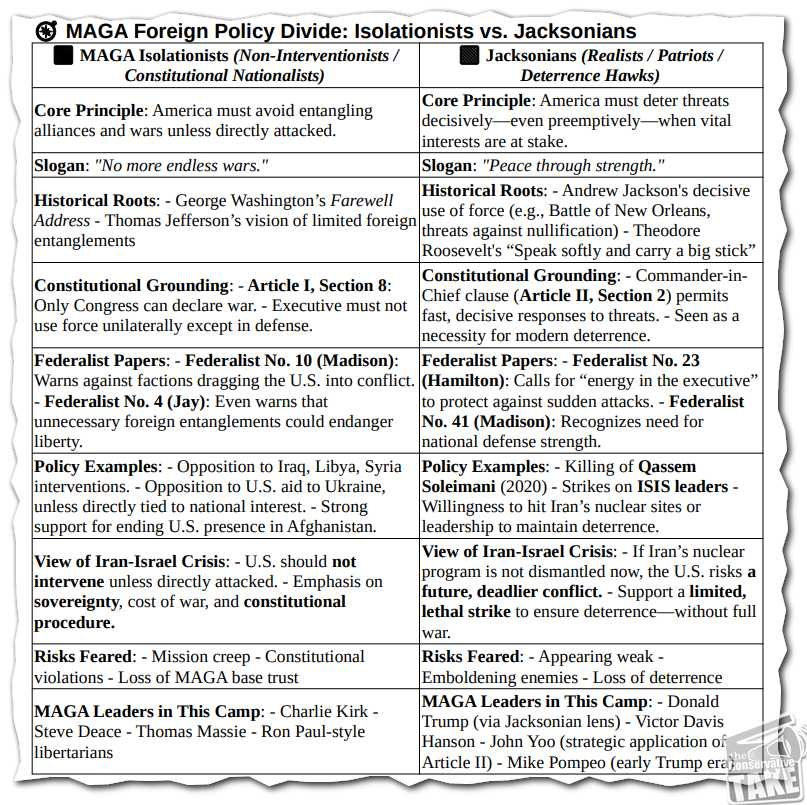The Middle East is a powder keg, with Iran weakened but resolute, Israel pressing its advantage, and the U.S. caught in a high-stakes geopolitical chess game. For President Trump, the challenge is not just strategic but deeply political: how to navigate the Iran-Israel conflict without fracturing the MAGA coalition, a movement split between two distinct camps: the isolationists and the Jacksonians. This article explores both perspectives, drawing on key voices like Charlie Kirk and Victor Davis Hanson, before offering a path forward that parallels Lincoln’s Fort Sumter dilemma and ties Trump’s foreign policy to his domestic promises.
The Isolationist Case: No More Wars, No Exceptions
For a significant wing of the MAGA coalition, the foreign policy mandate is unequivocal: no more wars. Often labeled isolationists (though many prefer non-interventionists or constitutional nationalists) this faction grounds its stance in moral conviction and constitutional fidelity. Their argument hinges on Article I, Section 8 of the Constitution, which reserves war declarations for Congress, and George Washington’s warning to avoid foreign entanglements unless vital U.S. interests are at stake.
Charlie Kirk, a prominent America First voice, crystallizes this view:
“MAGA has never and will never stand for regime change.”
To these voters, Trump’s first-term strength lies in what he avoided: no invasions of Iran, Syria, or North Korea; no nation-building after defeating the ISIS caliphate. They view the current Iran-Israel war as a neoconservative trap, designed to lure Trump into betraying his base and reviving the Bush-era quagmire. Polls underscore their influence:
71% of Americans oppose new Middle East wars.
63% of Republicans agree.
Among Trump’s base under 45, “no more wars” is the top issue.
- Evangelical support for Israel has dropped 12% since 2020.
The isolationists’ fear is a slippery slope. Even a limited strike on Iran, they argue, could spiral into a broader conflict, echoing the disasters of Iraq and Libya. They distrust war hawks in Washington and see Iran’s provocations as a bait to entangle America in another endless war. For this faction, the MAGA coalition (where isolationists form a substantial and growing bloc) will not forgive Trump if he takes the bait.
The Jacksonian Case: Strike Hard, Finish Strong
In contrast, the Jacksonians (realists, patriots, and deterrence hawks) represent the other pillar of the MAGA coalition, and Trump has always embodied their ethos. For Jacksonians, restraint is not pacifism but strategic ambiguity backed by overwhelming force. They see Iran not as a distant irritant but as the region’s deadliest terror sponsor, playing a long game for nuclear capability.
Victor Davis Hanson frames this perspective with stark clarity:
“If this war ends with the Iranian regime intact and a recoverable nuclear program… it will be a disaster.”
Jacksonians argue that Israel’s recent strikes have crippled Iran’s proxies (i.e. Hamas, Hezbollah, Houthis, and Syrian assets) leaving Tehran vulnerable. This is a rare window to permanently destroy Iran’s nuclear infrastructure and leadership, ensuring deterrence and preventing a future nuclear-armed Iran. Trump’s past actions such as eliminating Qassem Soleimani, Abu Bakr al-Baghdadi, and Russian Wagner Group mercenaries, reflect this Jacksonian playbook: no ground wars, but decisive, overwhelming strikes to reassert American strength.
Hanson acknowledges the political tightrope:
“Trump can’t afford to look like he’s starting a war but if Iran survives, the perception will be that he blinked.”
For Jacksonians, the risk of inaction is greater than action. A surviving Iranian regime could rebuild its nuclear program, embolden adversaries, and undermine U.S. credibility. They urge Trump to frame any strike as strategic self-defense, not regime change, to align with MAGA’s anti-neocon instincts while delivering a blow that clears the path for Israel to secure a lasting settlement.

the Conservative TAKE's Case: Trump as Lincoln at Fort Sumter
Trump faces a dilemma akin to Abraham Lincoln’s in 1861 at Fort Sumter. Lincoln promised to defend the Union but vowed not to start a war. He held federal forts but refused to fire the first shot. When the South attacked Sumter, Lincoln gained the moral authority and public support to act decisively, uniting a fractured nation behind him. Trump stands at a similar precipice, balancing the isolationist and Jacksonian wings of the MAGA coalition while facing a volatile Middle East.
Option 1: Wait for Iran’s Move
Trump should wait for Iran to strike first whether against Israel, U.S. assets, or in the Strait of Hormuz. This aligns with the Carter Doctrine (protecting U.S. interests in the Gulf) and gives Trump constitutional clarity to respond, satisfying the isolationists’ demand for restraint and congressional oversight. A clear Iranian provocation would rally MAGA behind a defensive response, framed not as war but as deterrence.
The risk: Waiting invites catastrophe. An Iranian missile strike on Tel Aviv or U.S. ships could cause significant casualties, making Trump appear weak or reactive. Isolationists, a sizable chunk of the MAGA coalition (especially younger voters), might still balk if the response escalates beyond a single strike, fearing another Iraq-like quagmire.
Option 2: Strike First, Convince MAGA
Alternatively, Trump could launch a limited but devastating campaign to destroy Iran’s nuclear infrastructure and take out its leadership, paving the way for Israel to negotiate a regional settlement. This aligns with the Jacksonian instinct to hit hard and finish strong. To avoid fracturing the coalition, Trump must convince MAGA that this is not regime change but a preemptive strike to permanently eliminate Iran’s nuclear threat. This is a promise, mind you, that he made since 2015.
The risk: Persuading the isolationists is daunting. Their distrust of foreign wars runs deep, and they form a significant portion of the MAGA base, amplified by voices like Charlie Kirk. A misstep could alienate this bloc, threatening the coalition’s unity. Even a well-framed strike risks being painted as a betrayal by anti-war populists.
The Path Forward: Double Down Domestically
Regardless of the path, Trump must double down on domestic priorities to preserve the MAGA coalition. The isolationists and Jacksonians will forgive either scenario (waiting or striking) if Trump delivers at home:
Triple deportations to address immigration, a core MAGA issue.
Pass the One Bill to Build (OBBB) to rebuild infrastructure and to deliver on MAGA promises.
Double down on DOGE to gut government waste and unleash efficiency.
These bold moves can anchor the coalition, offsetting foreign policy risks and reinforcing Trump’s commitment to the “forgotten men and women” who power MAGA.
In the end: Saving the Coalition Means Saving the Republic
The MAGA coalition boils down to two camps: isolationists, who demand peace and constitutional restraint, and Jacksonians, who seek strength and decisive action. The Iran-Israel conflict tests Trump’s ability to bridge this divide. Like Lincoln at Fort Sumter, he must wait for Iran’s first move to justify a response, or, if striking first, convince MAGA that it’s about deterrence, not regime change. Either path carries risks (catastrophic casualties from waiting, or alienating isolationists from striking) but domestic victories can hold the coalition together.
By acting as a Jacksonian, leading like Lincoln, and governing as a constitutional originalist, Trump can thread the Middle East needle. Time will tell but if he succeeds, he will preserve the MAGA coalition and, in my opinion, much like in Lincoln’s day, the republic.















